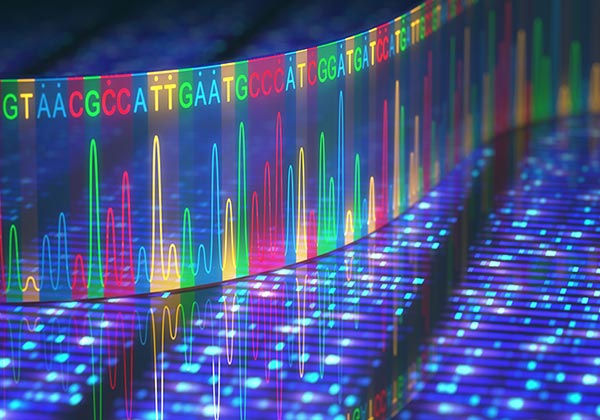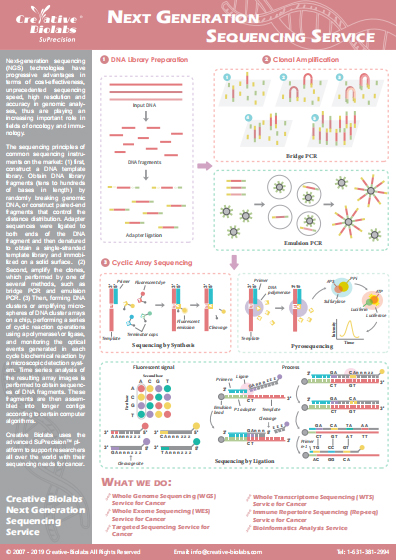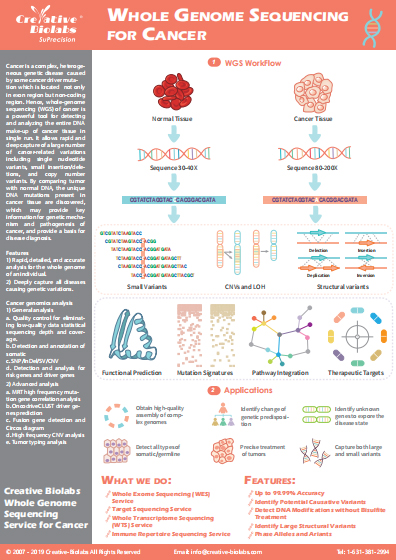
Whole Exome Sequencing (WES) based Copy-Number Variant (CNV) Detection Service
Whole exome sequencing (WES) is increasingly used for studying human disease, of which copy-number variants (CNVs) are a critical genetic component. With Ph.D. level scientists and many years’ experience in next-generation-sequencing (NGS), Creative Biolabs has established a cutting-edge SuPrecision™ platform for large-scale sequencing services. Our scientists have exploited a statistical tool to normalize exome read depth of WES data for CNVs analysis by using principal-component analysis. We can provide the best CNVs detection service at the most competitive cost.
Current Methods for CNVs Detection
In the last decade, CNVs emerged as a category of structural genetic diversity that plays a key role in human health and common disease. A number of studies have implicated deletion and duplication CNVs in cancer susceptibility, metastasis, gene expression, and treatment. Similarly, rare CNVs are enriched in individuals with severe neuropsychiatric conditions. In fact, copy-number changes are the variants that have the largest known effect on the risk of schizophrenia possibly as a result of the constant introduction of de novo germline mutations. Microarray-based approaches, including SNP arrays or array comparative genomic hybridization (aCGH) have been used for CNV analysis. Although aCGH has gained resolution over the years, its widespread use might be limited because of its focus on CNV discovery at the expense of other variation. Knowledge regarding the scope of CNV effects on disease is still incomplete. The introduction of NGS technology has provided a window into the genome at base-pair resolution and has the advantage of allowing simultaneous discovery of single-nucleotide, indel, and structural variation. Numerous existing tools have placed CNV calling on solid ground for whole-genome sequencing data by utilizing diverse information. This information includes unusual mapping of read mate pairs to the reference genome, ‘‘split’’ reads that span breakpoints, and sequencing depth of coverage. In contrast, because WES takes aim at a sparse set of noncontiguous exons, most CNV breakpoints will not be sequenced, leaving read depth as the predominant indicator of CNVs.
-Detection.jpg)
CNVs Detection Service at Creative Biolabs
Detecting copy number from exome sequencing is challenging because of the noncontiguous nature of the captured exons. This is compounded by the complex relationship between read depth and copy number. In order to alleviate the above problems, Creative Biolabs has exploited a statistical toolset for exon-resolution CNVs detection from WES data with a disease-motivated focus on rare events. Our tool extracts copy-number signal from noisy read depth by leveraging the large-scale nature of sequencing projects to discern patterns of read-depth biases. We can perform rigorous data-driven normalization by running a principal-component analysis, which does not require detailed knowledge of the particular confounders. This statistical toolset is uniquely suited to detect de novo CNVs and other events requiring high-confidence accuracy, including CNVs whose breakpoints fall within a gene and leave only a partial segment.
Key Advantages of CNVs Detection Service at Creative Biolabs Include but Are Not imited to:
- Detection of de novo CNVs
- Detection of rare CNVs
- Higher specificity and sensitivity
- Advanced SuPrecision™ platform
Equipped with world-leading technology platforms and professional scientific staff in NGS, Creative Biolabs has accumulated extensive experiences in WES and data management. We can offer top-quality services for the detection of de novo and rare CNVs to all our global customers.
Please contact us for more information and a detailed quote.
Resources
Infographics
Podcast
- TMB Analysis for Checkpoint Immunotherapy Response
- WES based Variant Analysis
- WES based Structural Variant Detection
- WES based Tumor-Specific Neoantigen Discovery
- WES based Biomarker Discovery
- Personal Tumor-Specific Neoantigen Vaccine Development
- MRD Monitoring
- Microsatellite Instability Analysis
- Immune Repertoire Germline Gene & Allele Identification
- One-Stop Cancer 3D Modeling
- Circle-Seq based eccDNA Identification
- RNA-Seq based Tumor Microenvironment Analysis




